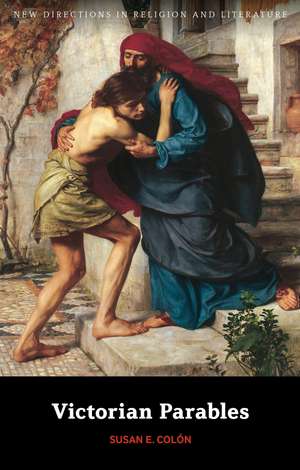Victorian Parables: New Directions in Religion and Literature
Autor Dr Susan E. Colonen Limba Engleză Paperback – 8 feb 2012
| Toate formatele și edițiile | Preț | Express |
|---|---|---|
| Paperback (1) | 215.88 lei 6-8 săpt. | |
| Bloomsbury Publishing – 8 feb 2012 | 215.88 lei 6-8 săpt. | |
| Hardback (1) | 712.06 lei 6-8 săpt. | |
| Bloomsbury Publishing – 8 feb 2012 | 712.06 lei 6-8 săpt. |
Din seria New Directions in Religion and Literature
-
 Preț: 192.27 lei
Preț: 192.27 lei - 30%
 Preț: 509.20 lei
Preț: 509.20 lei - 30%
 Preț: 509.86 lei
Preț: 509.86 lei - 30%
 Preț: 510.03 lei
Preț: 510.03 lei - 24%
 Preț: 195.56 lei
Preț: 195.56 lei -
 Preț: 176.86 lei
Preț: 176.86 lei - 21%
 Preț: 215.96 lei
Preț: 215.96 lei - 14%
 Preț: 175.91 lei
Preț: 175.91 lei - 30%
 Preț: 566.83 lei
Preț: 566.83 lei - 23%
 Preț: 190.87 lei
Preț: 190.87 lei - 21%
 Preț: 217.35 lei
Preț: 217.35 lei - 24%
 Preț: 195.37 lei
Preț: 195.37 lei - 23%
 Preț: 254.55 lei
Preț: 254.55 lei - 14%
 Preț: 176.44 lei
Preț: 176.44 lei - 24%
 Preț: 188.55 lei
Preț: 188.55 lei - 14%
 Preț: 196.96 lei
Preț: 196.96 lei - 23%
 Preț: 192.55 lei
Preț: 192.55 lei - 14%
 Preț: 183.70 lei
Preț: 183.70 lei - 23%
 Preț: 191.38 lei
Preț: 191.38 lei - 23%
 Preț: 254.02 lei
Preț: 254.02 lei - 14%
 Preț: 176.86 lei
Preț: 176.86 lei - 23%
 Preț: 254.55 lei
Preț: 254.55 lei - 14%
 Preț: 164.59 lei
Preț: 164.59 lei - 24%
 Preț: 190.33 lei
Preț: 190.33 lei - 13%
 Preț: 229.86 lei
Preț: 229.86 lei - 30%
 Preț: 508.95 lei
Preț: 508.95 lei - 30%
 Preț: 540.54 lei
Preț: 540.54 lei -
 Preț: 176.44 lei
Preț: 176.44 lei - 23%
 Preț: 235.00 lei
Preț: 235.00 lei
Preț: 215.88 lei
Preț vechi: 244.22 lei
-12% Nou
Puncte Express: 324
Preț estimativ în valută:
41.31€ • 43.13$ • 34.19£
41.31€ • 43.13$ • 34.19£
Carte tipărită la comandă
Livrare economică 05-19 aprilie
Preluare comenzi: 021 569.72.76
Specificații
ISBN-13: 9781441146502
ISBN-10: 1441146504
Pagini: 176
Dimensiuni: 138 x 216 x 13 mm
Greutate: 0.26 kg
Ediția:New.
Editura: Bloomsbury Publishing
Colecția Continuum
Seria New Directions in Religion and Literature
Locul publicării:London, United Kingdom
ISBN-10: 1441146504
Pagini: 176
Dimensiuni: 138 x 216 x 13 mm
Greutate: 0.26 kg
Ediția:New.
Editura: Bloomsbury Publishing
Colecția Continuum
Seria New Directions in Religion and Literature
Locul publicării:London, United Kingdom
Caracteristici
Innovative and deeply contextualized readings of novels by Charlotte Yonge, Margaret Oliphant and Charles Dickens.
Notă biografică
Susan E. Colón is Associate Professor of Literature in the Honors College at Baylor University in Waco, Texas, USA. She is the author of The Professional Ideal in the Victorian Novel: The Works of Trollope, Disraeli, George Eliot, and Gaskell (Palgrave, 2007).
Cuprins
Preface \ 1. Parable as Literature, Literature as Parable \ 2. The Extraordinary in the Ordinary: Parable and Realism \ 3. "The Parable of Actual Life": Charlotte Yonge's The Heir of Redclyffe \ 4. Prodigal Sons in the Fiction of Margaret Oliphant \ 5. "The Agent of a Superior": Stewardship Parables in Our Mutual Friend \ Afterword \ Notes\ Bibliography \ Index
Recenzii
'Susan Colón offers an original and highly accessible account of the way in which these subversive gospel stories worked at an ethical level to challenge the reading practices of Victorian readers. She provides equally assured guidance both through theoretical issues and in exemplary readings of works by Charlotte Yonge, Margaret Oliphant and Charles Dickens.'
'This is a very satisfying book indeed.So much that other scholars do not see or get wrong Susan E. Colón observes and gets right.Victorian Parables not only offers insightful readings of Charlotte Yonge, Margaret Oliphant, and Charles Dickens, it defines and illuminates the genre of parables in a way that it would do literary scholars, theologians, and students of the Bible well simply to follow with humility and gratitude.'
'Victorian Parables applies theories of biblical hermeneutics to historically contextualized readings of Victorian novels in a clear, fresh and provocative way which overcomes conventional critical dichotomies opposing religious belief and novelistic realism. Colón's book represents a significant contribution to the post-secular interpretation of Victorian culture.'
Colon . insists on a rhetorically and historically precise understanding of parable as a literary form . She focuses especially on realist novels, which she, following Andrew H. Miller, sees as ethically freighted in a way that has yet to be adequately discussed. Her careful study does much to correct this error.
'This is a very satisfying book indeed.So much that other scholars do not see or get wrong Susan E. Colón observes and gets right.Victorian Parables not only offers insightful readings of Charlotte Yonge, Margaret Oliphant, and Charles Dickens, it defines and illuminates the genre of parables in a way that it would do literary scholars, theologians, and students of the Bible well simply to follow with humility and gratitude.'
'Victorian Parables applies theories of biblical hermeneutics to historically contextualized readings of Victorian novels in a clear, fresh and provocative way which overcomes conventional critical dichotomies opposing religious belief and novelistic realism. Colón's book represents a significant contribution to the post-secular interpretation of Victorian culture.'
Colon . insists on a rhetorically and historically precise understanding of parable as a literary form . She focuses especially on realist novels, which she, following Andrew H. Miller, sees as ethically freighted in a way that has yet to be adequately discussed. Her careful study does much to correct this error.
